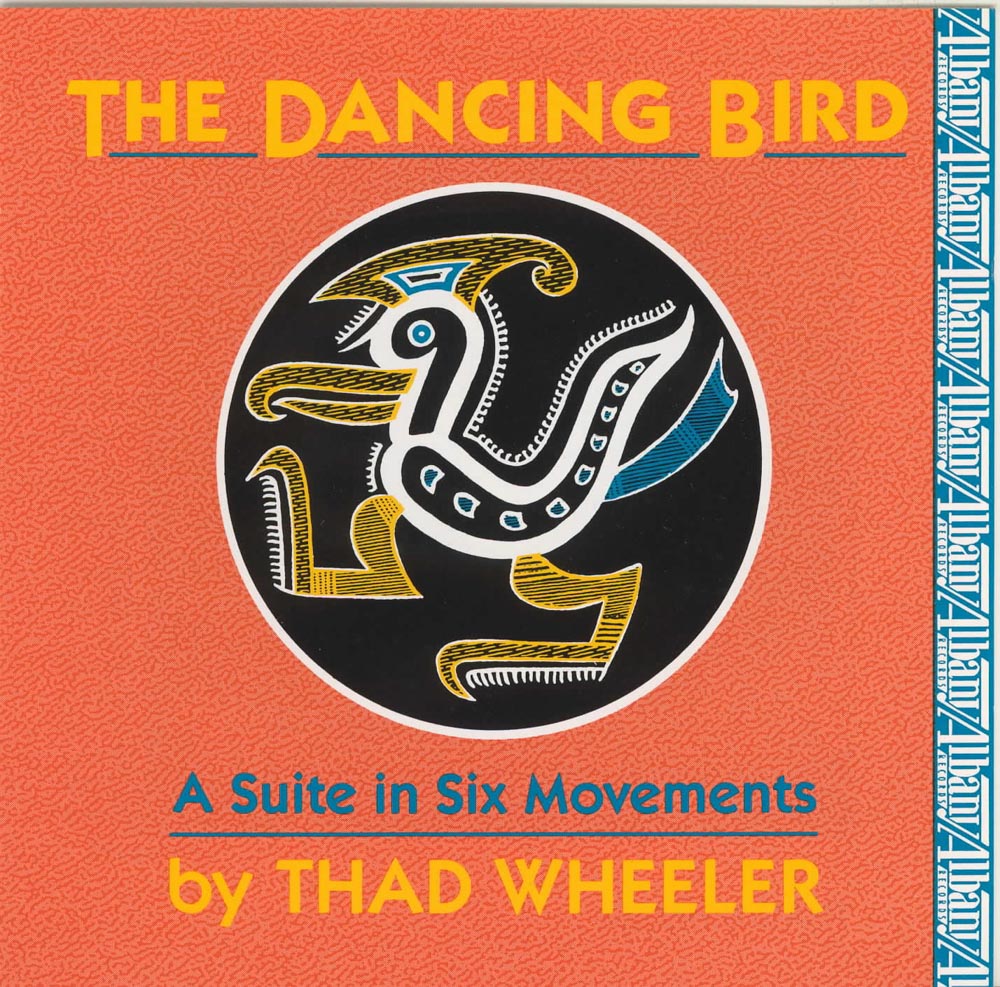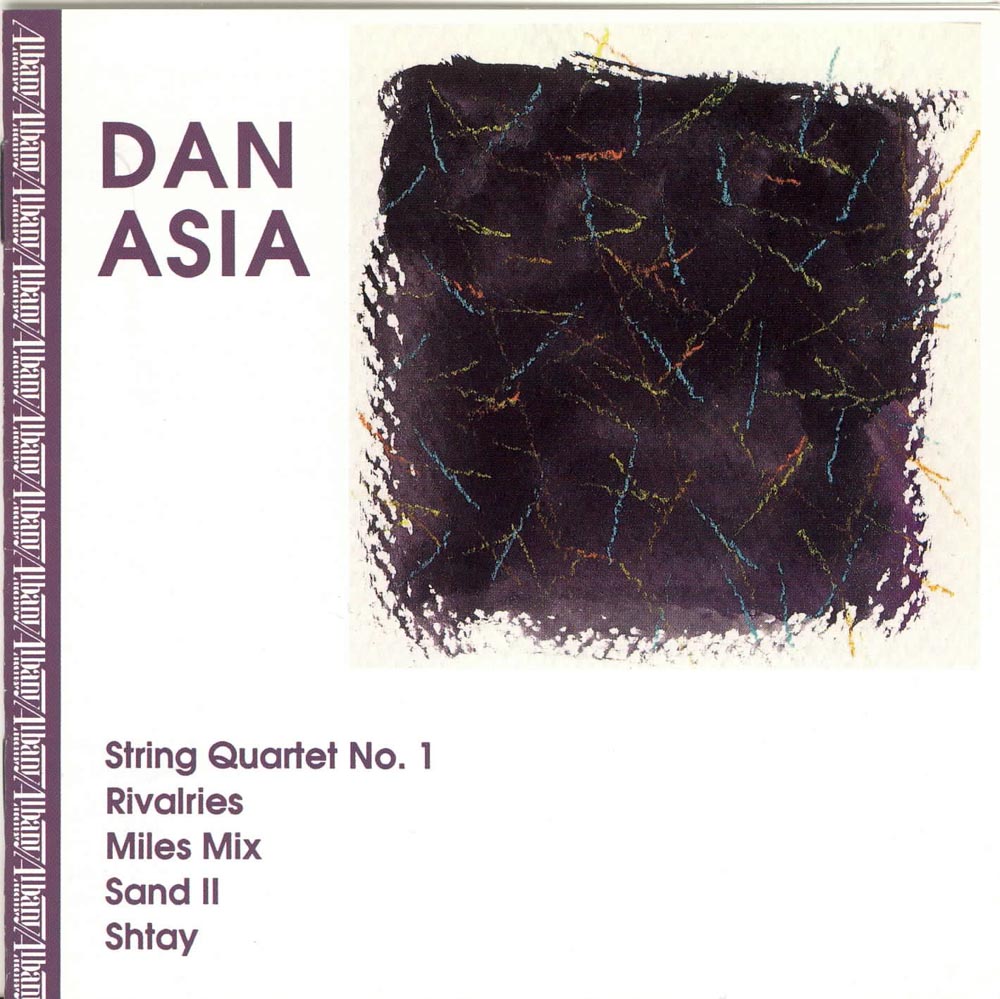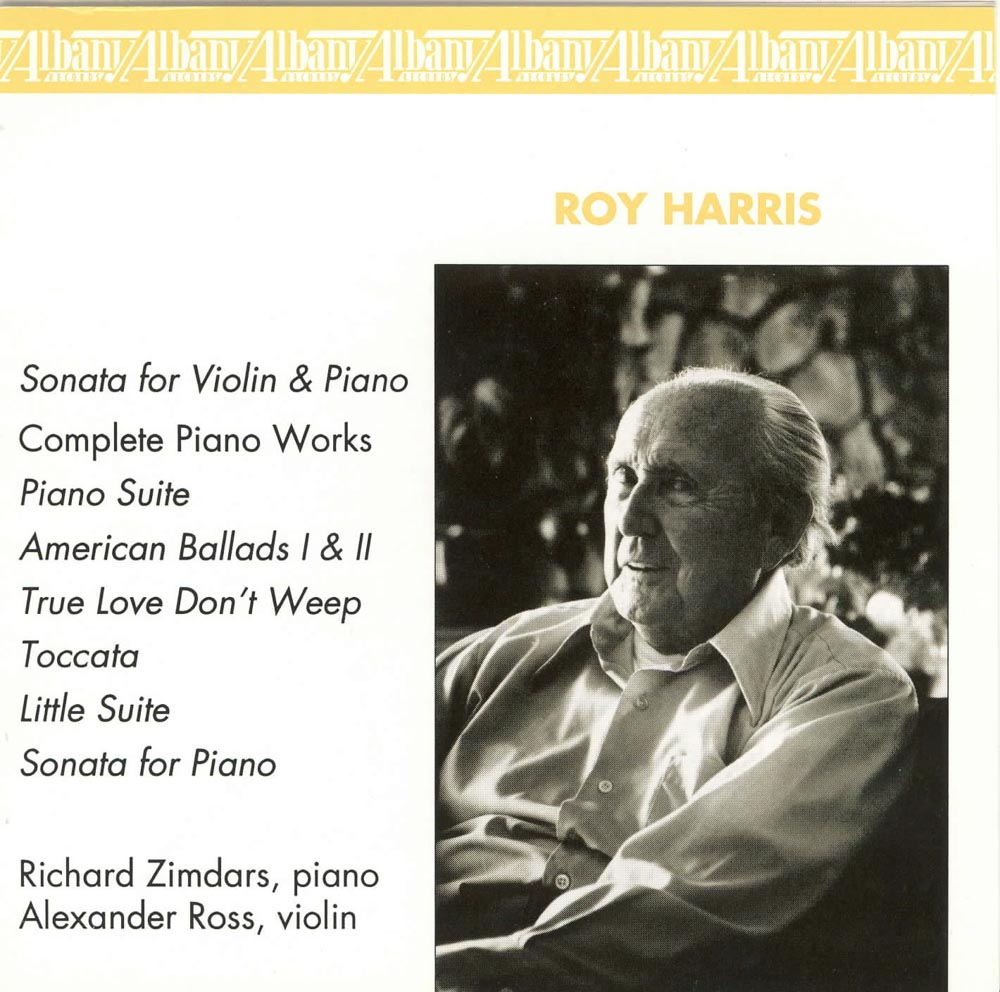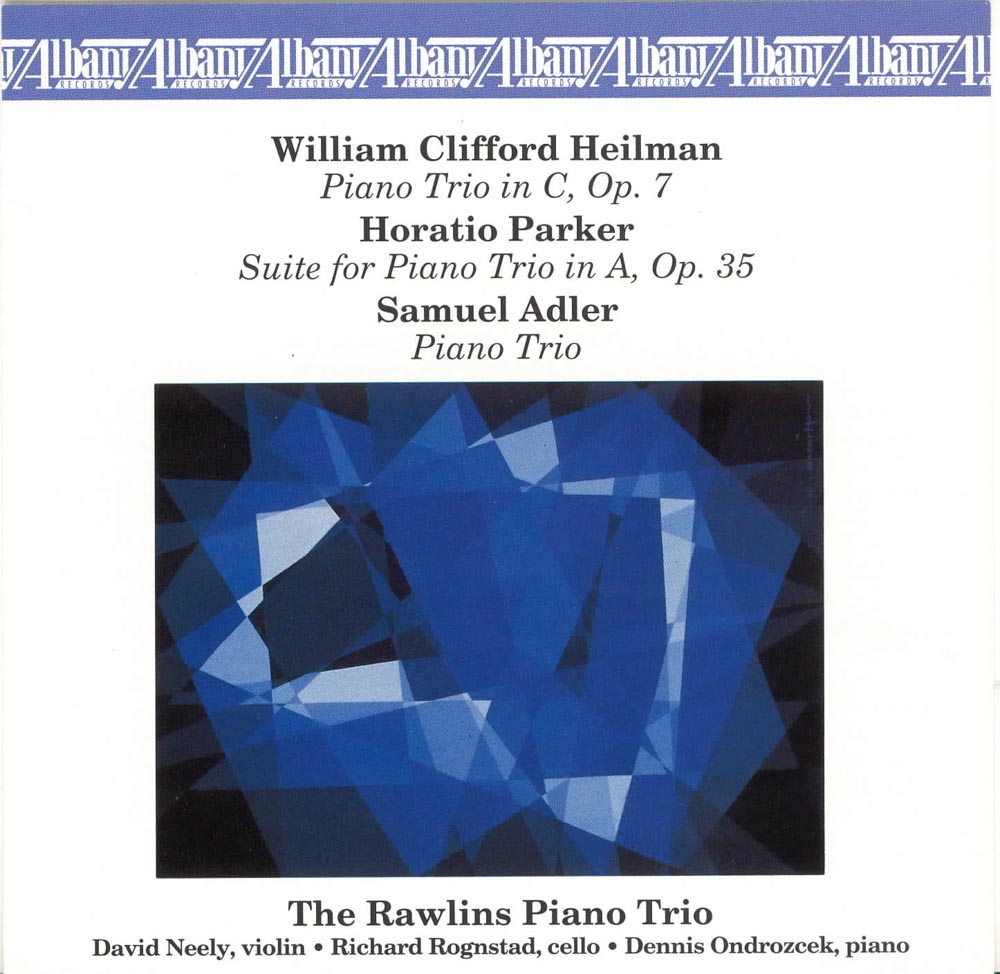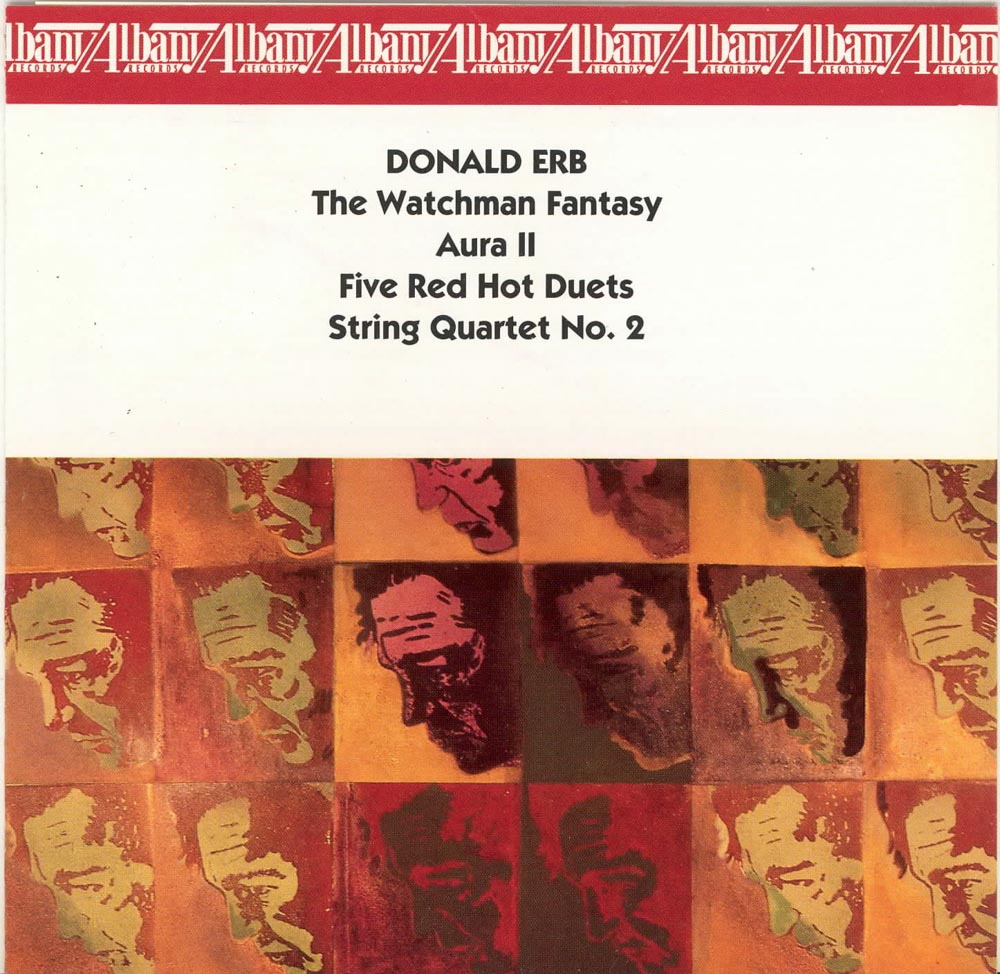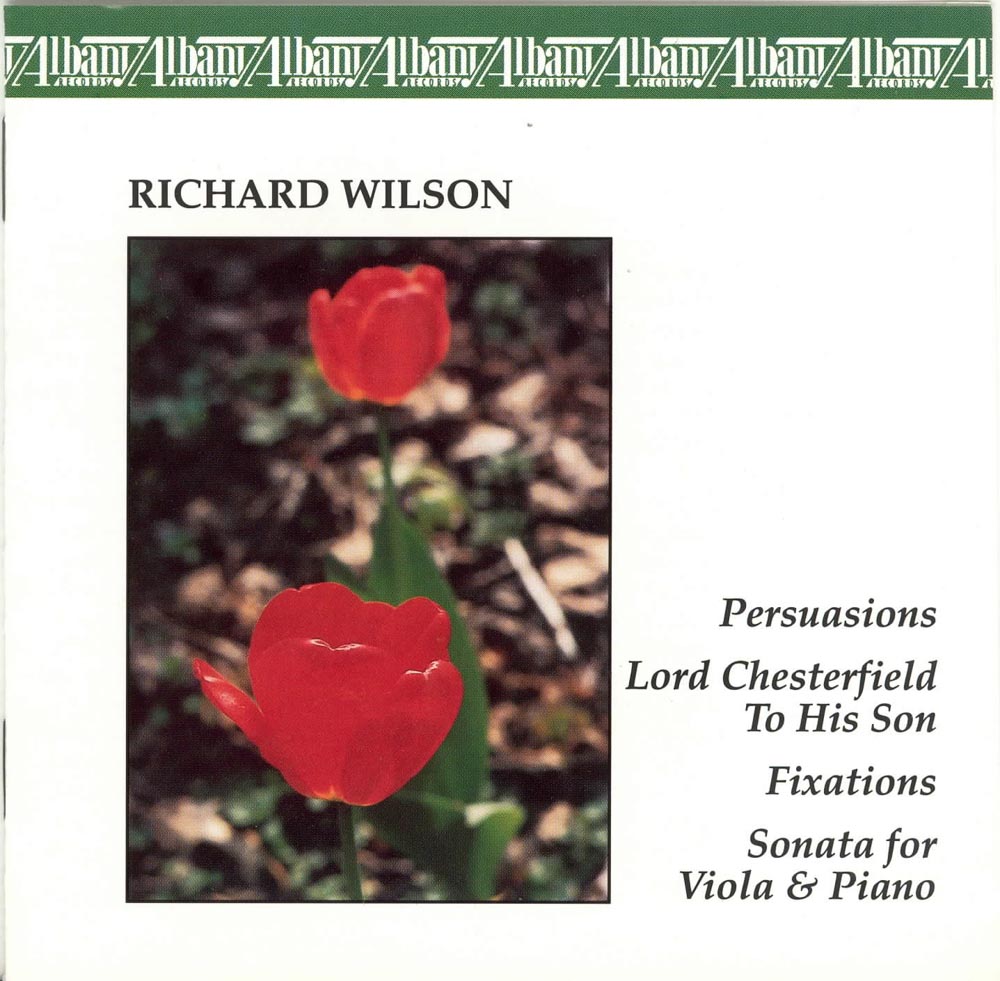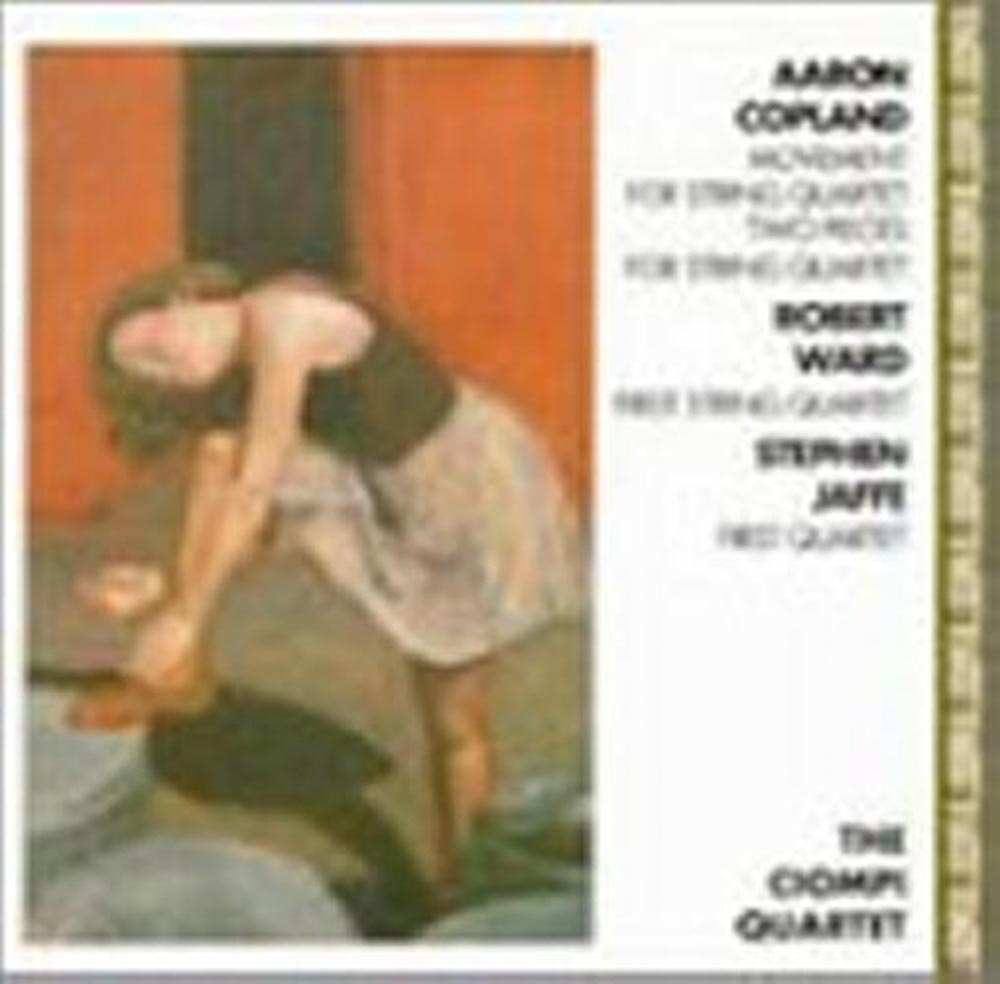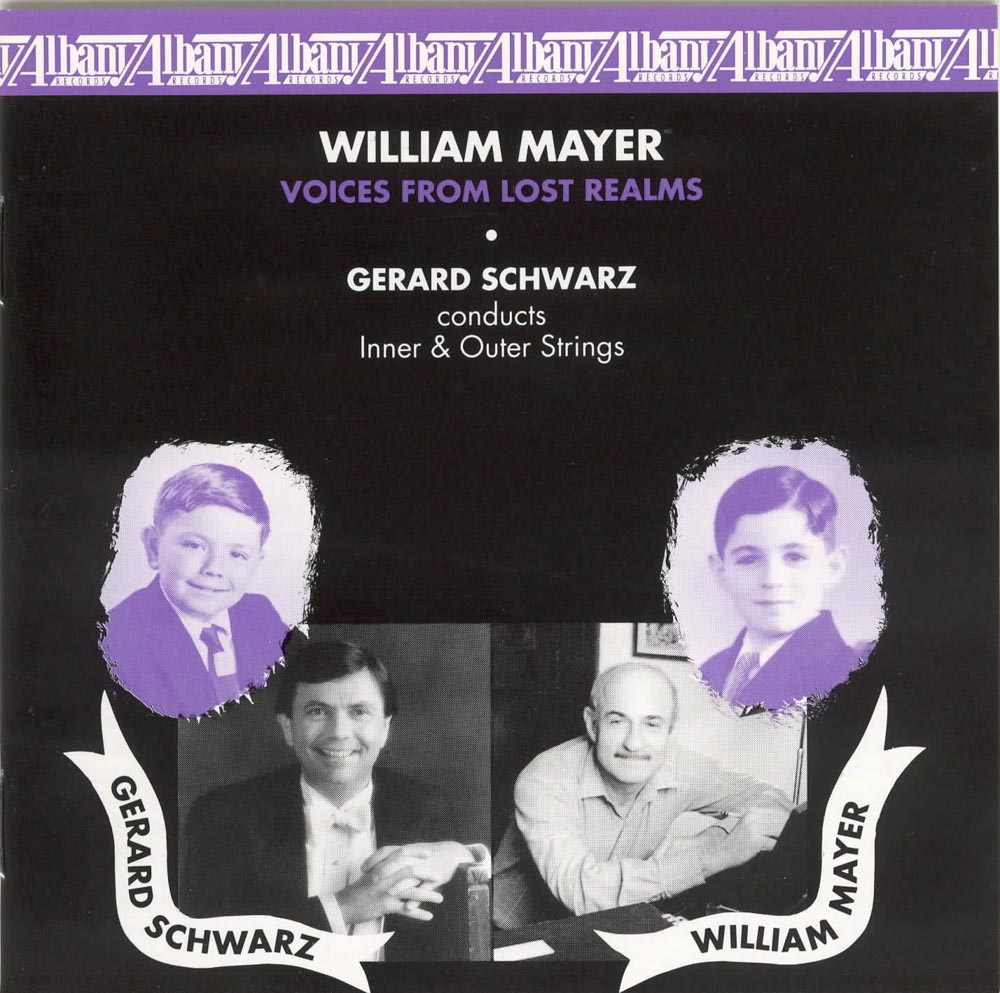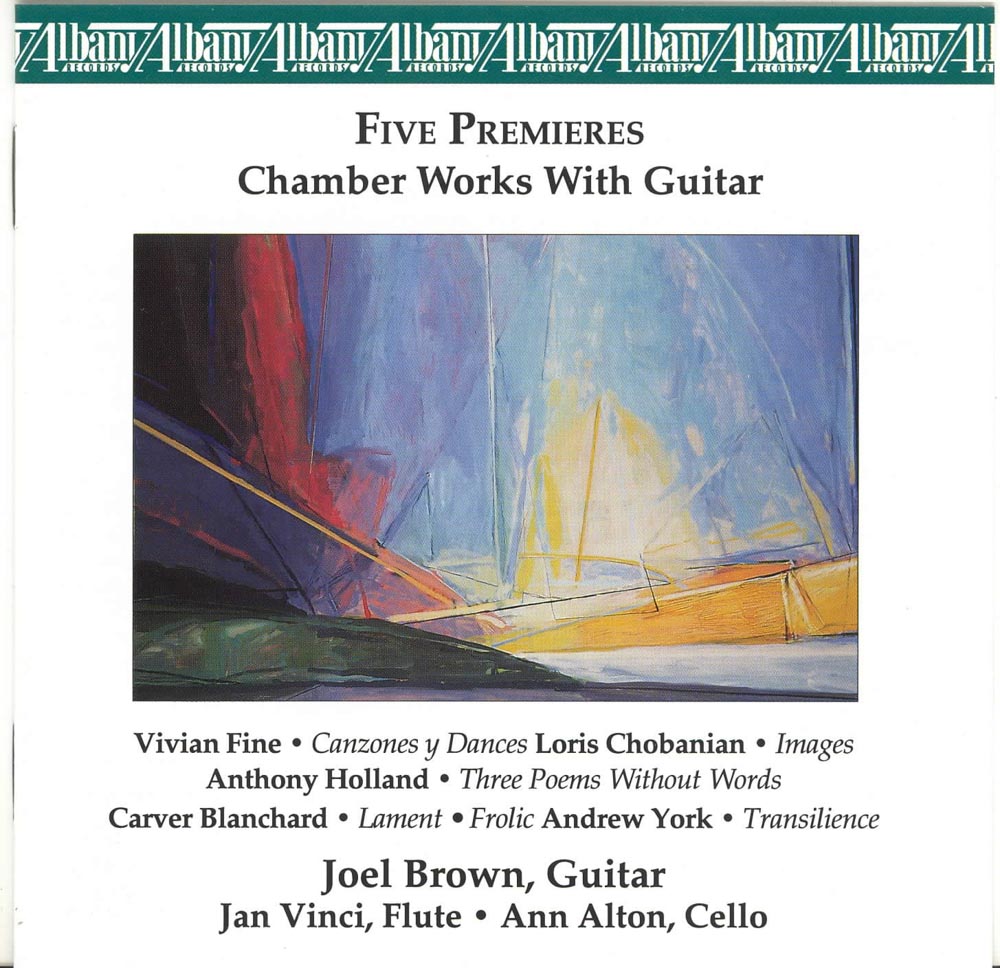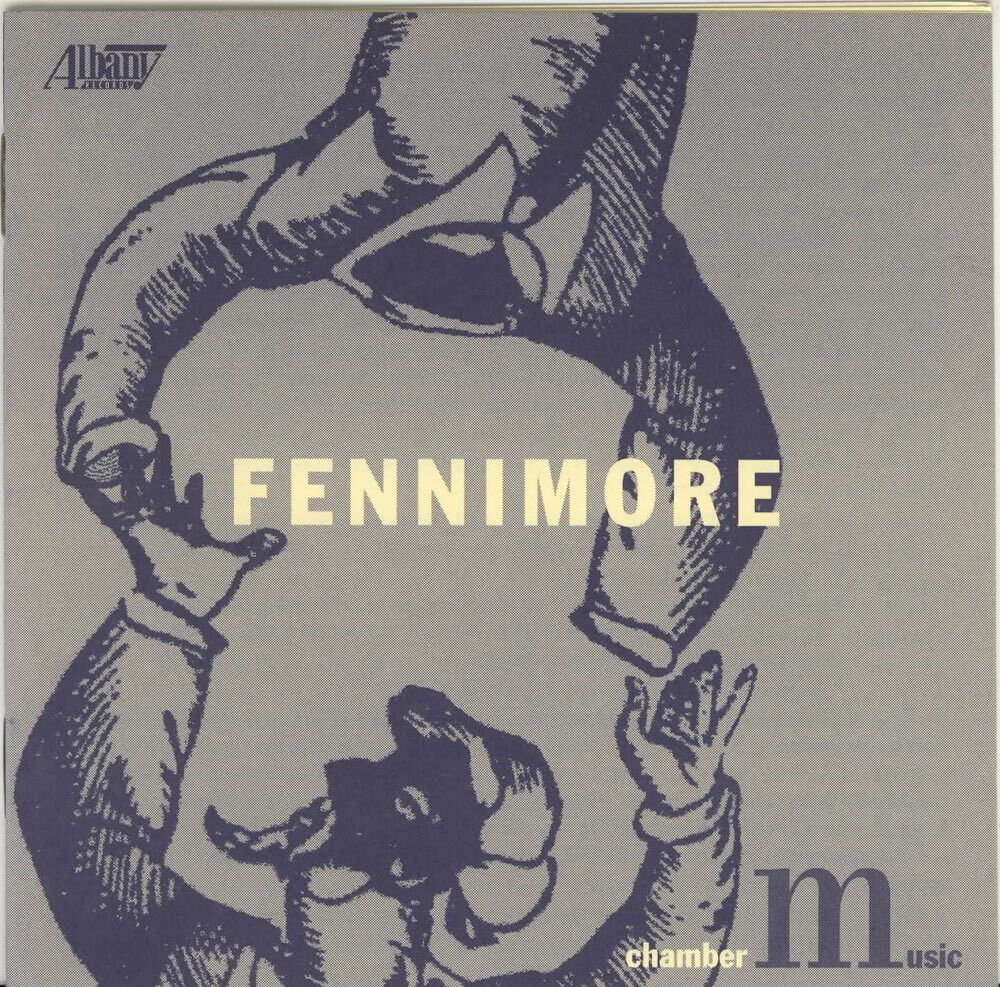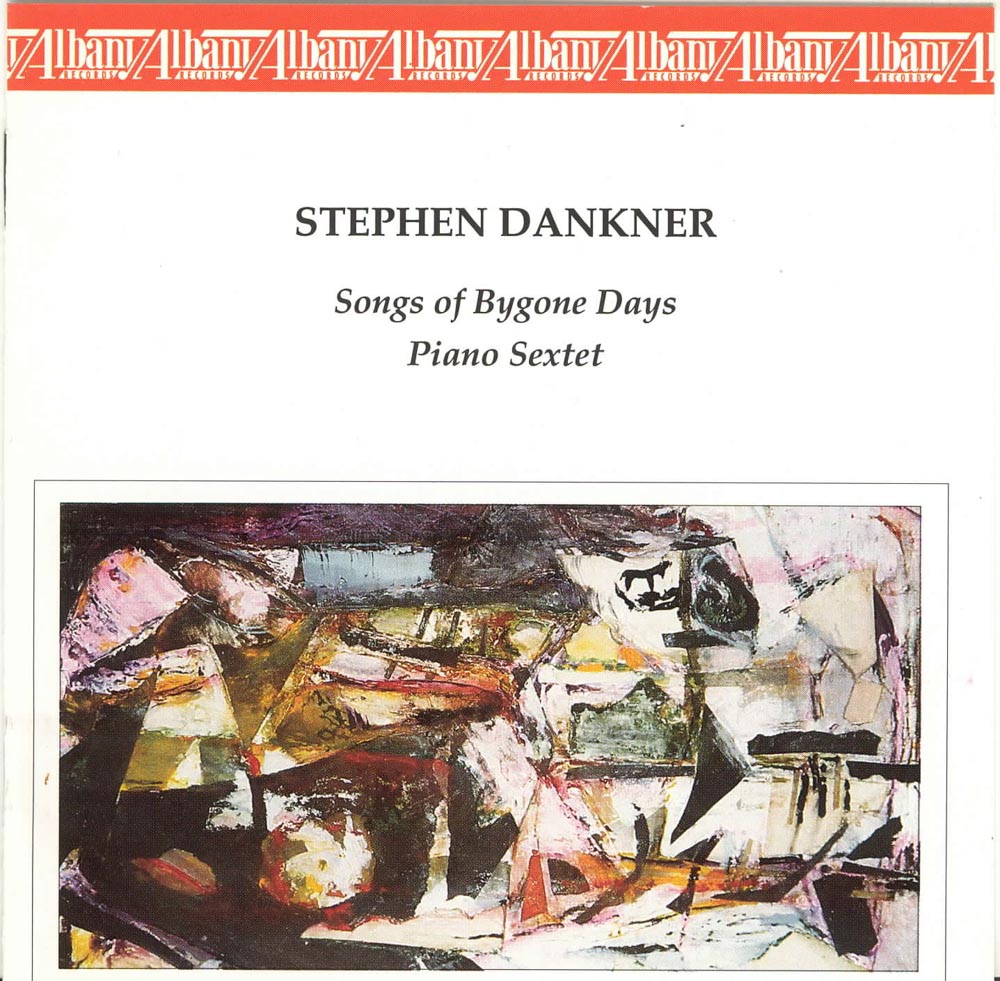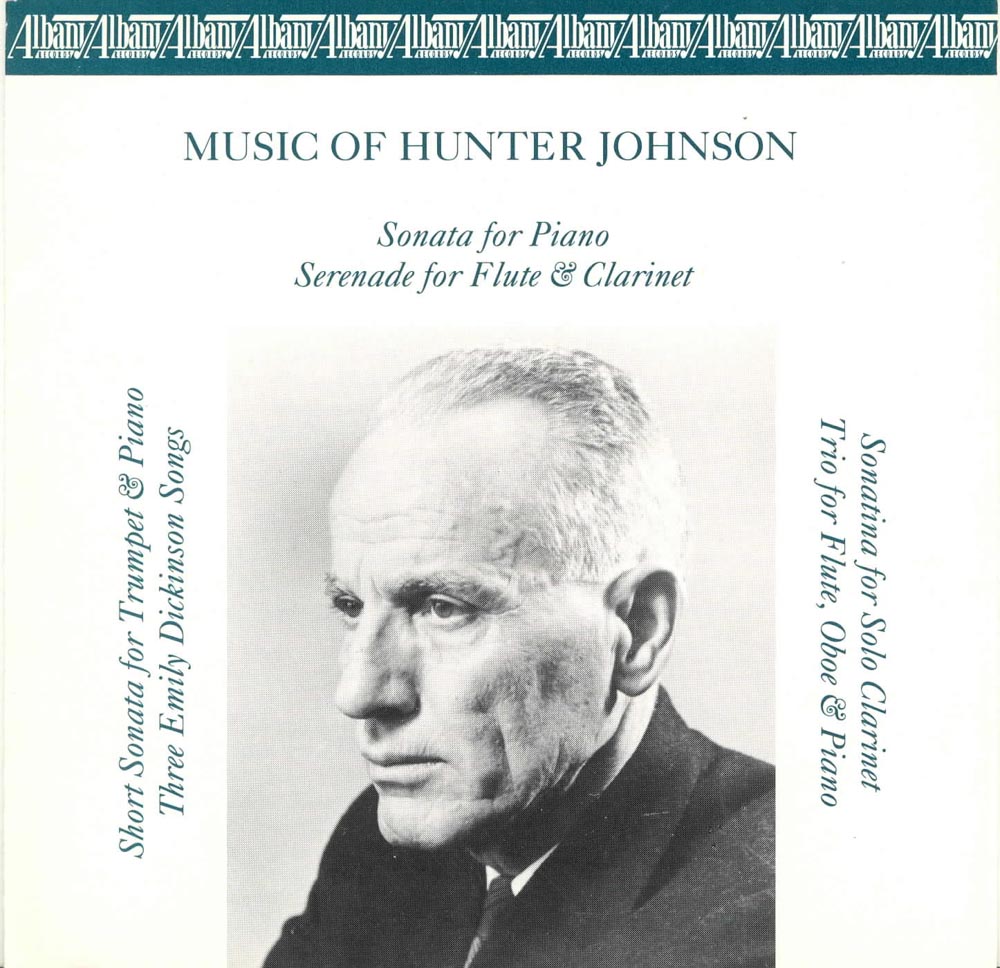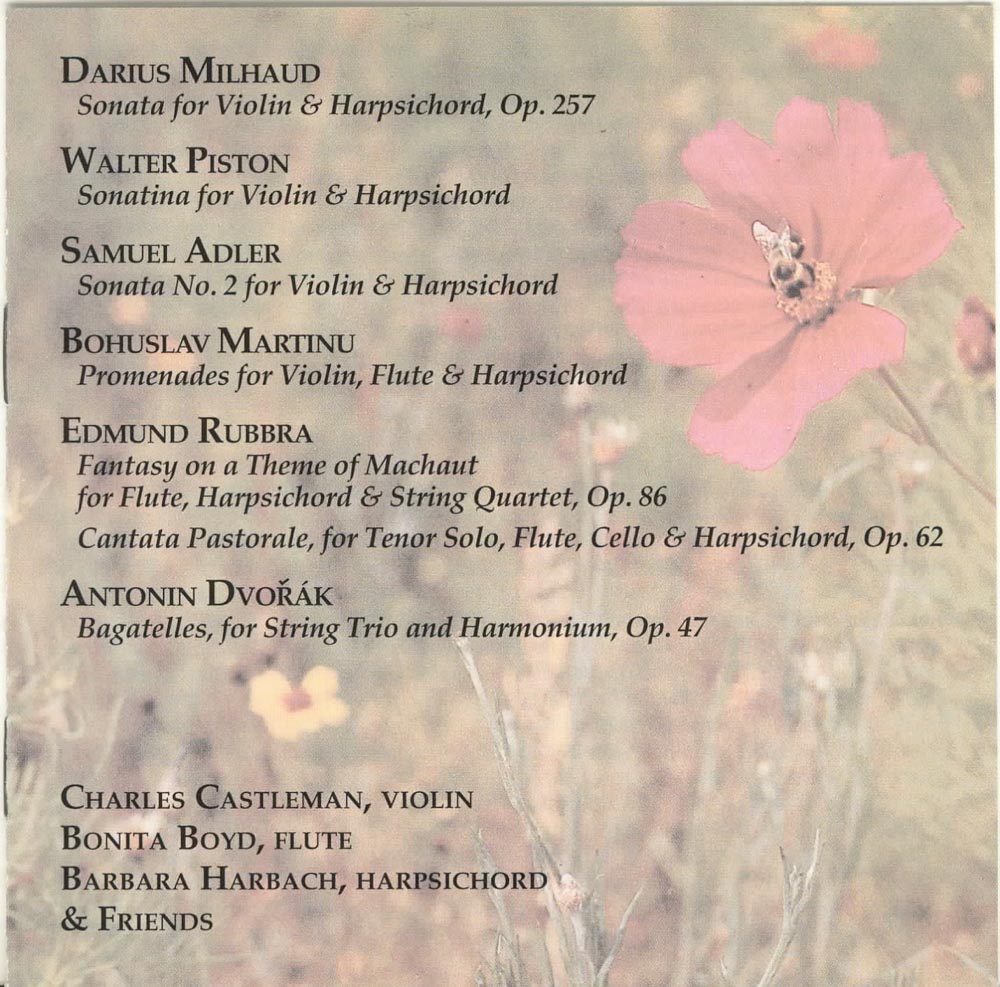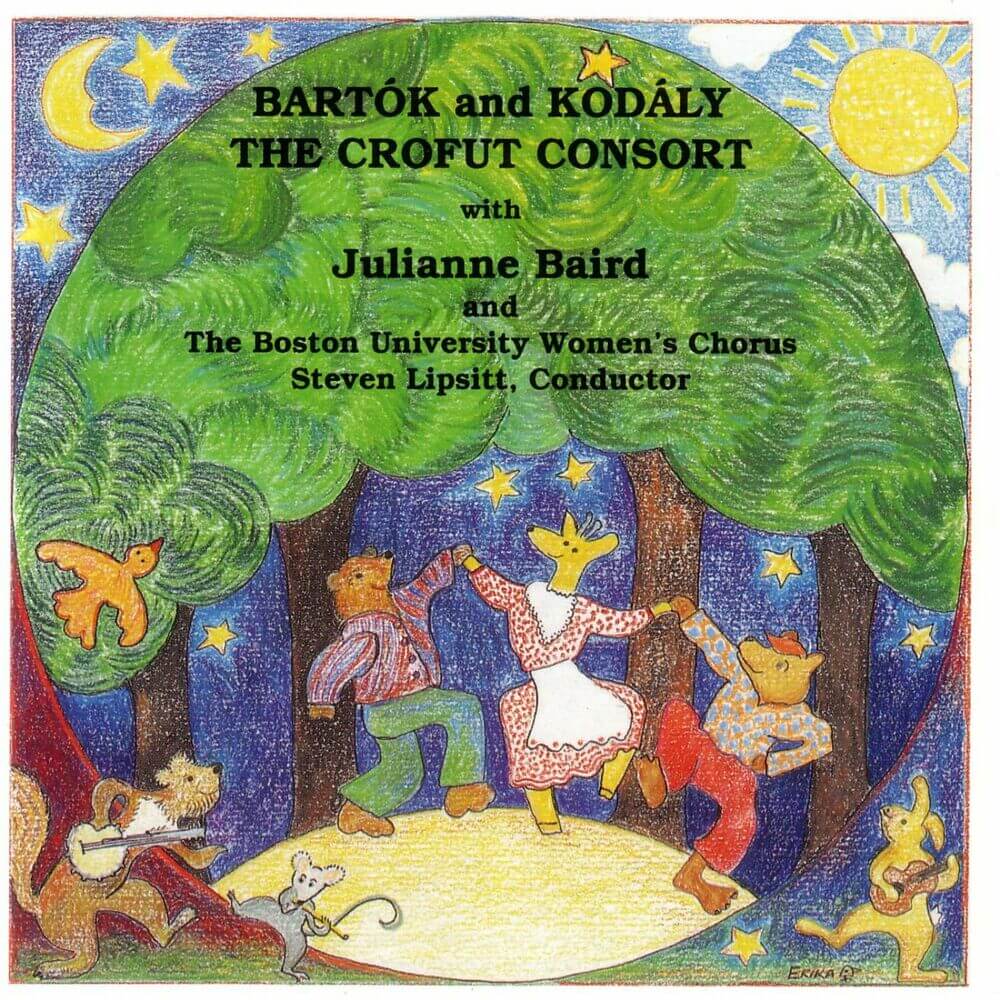Catalog #: TROY0114
Release Date: July 1, 1994Chamber"I composed The Dancing Bird in response to a need expressed by Francesca Vanasco for a number of original works for the unusual combination of flute, cello, bass and vibraphone that make up Alborada Latina, the chamber ensemble for Latin American Music," says Thad Wheeler. "The Dancing Bird was begun after I received a diagram of a Spanish Sevillanas from Basilio Georges. I used the 47 bar form as a framework for "Sevillanas Magicas," a Spanish sevillanas with an American accent. I hen went on to write "Bulerias," "Purple Night," and "Scherzo Merenque," integrating structural and developmental devices used by Beethoven with flamenco and Venezuelan rhythms and my own melodic and harmonic materials. The last piece composed for The Dancing Bird was "Glimmerglass." I wrote this piece while spending a great deal of time house-hunting in Cooperstown, New York in the late winter-early spring."
Catalog #: TROY0106
Release Date: January 1, 1994Chamber"All the works on this recording are from the late 1970s and early 1980s," comments Dan Asia. "They reflect my interest then I combining the energy of vernacular music (pop and jazz), with the structural and linguistic possibilities of contemporary classical music, and all of this refracted through the sonic possibilities suggested by the current nascent world of electronic music. While some of the works presented are solely electronic, and others are for acoustic instruments alone, my interest was in the cross fertilization that can occur between these genres." Dan Asia, composer-in-residence with the Phoenix Symphony, was born in Seattle, Washington in 1953. He has been the recipient of the most competitive grants and fellowships in music including a Meet The Composer-Reader's Digest Commission, a Guggenheim Fellowship, four NEA Composers Grants and ASCAP and BMI composition prizes. After receiving his B.A. degree from Hampshire College, where he studied music and European History, Mr. Asia attended the Yale School of Music, receiving the Master of Music degree. His major teachers include Jacob Druckman, Stephen Albert, Gunther Schuller, Isang Yun, Arthur Weisberg, Bruce MacCombie, Ron Perera, and Randall McClellan. He presently teaches at the University of Arizona in Tucson.
Catalog #: TROY0105
Release Date: November 1, 1993ChamberRoy Harris's life (1898-1979) was a singular phenomenon: humble beginnings on the family farm; truck driving to support his musical studies; study in Paris with Nadia Boulanger supported by a patroness; performances of his symphonies by Koussevitzky, Toscanini, Ormandy, and Bernstein; a series of academic positions around the country; marriage to a brilliant pianist; a large family of his own; and hard work up to the end of his days. Today's foremost authority on the life and works of Harris, musicologist Dan Stehman, has this to say about the piano works: "...the piano pieces reveal Harris's exceptional skill as a miniaturist, working concisely and unpretentiously to create clearly defined moods. For many listeners these compositions have served as the initial introduction to his music and, indeed, they remain one of the easiest approaches to his style and technique." In 1942 the Sonata for Violin and Piano was awarded the Elizabeth Sprague Coolidge Medal for eminent service to Chamber Music. Yehudi Menuhin, Josef Gingold, Henri Temianka, Sidney Harth, and Eudice Shapiro are among the distinguished violinists who have programmed it. Although Harris sanctioned cuts in the first and last movements, the performance recorded here presents the sonata in its entirety.
Catalog #: TROY0107
Release Date: October 1, 1993ChamberIt might be said that the composers on this recording represent three aspects of what Gilbert Chase called "Boston Classicism." Each composer had close ties to the musical life of Boston, and in his own way, each composer reflected European classical traditions. Typical of turn-of-the-century ideals, the two American-born composers, Parker and Heilman, studied in Germany, then brought back to New England the romantic European style that was then considered more acceptable than less cultured American styles. Paradoxically, Samuel Adler was born in Germany, but he studied in Boston. Even so, his style is solidly based on European classic techniques, especially on his love of Bach and Handel. The Rawlins Piano Trio was founded in the summer of 1987 at the University of South Dakota and named by the trio in honor of their principal benefactors. The trio has dedicated itself to performing works by American composers, as well as the more traditional piano trio literature. Performing throughout the United States, the Rawlins Piano Trio has been invited to perform for the International Sonneck Society for American Music and continues a very active concert schedule.
Catalog #: TROY0099
Release Date: September 1, 1993ChamberJay Weigel was born in New Orleans and graduated from Tulane University in 1981, while studying composition privately with Roger Dickerson. After receiving a Masters of Music Degree in Composition from the University of Southern California, he returned to New Orleans. In 1984, he was appointed Music Director of the Contemporary Arts Center and Lecturer of Composition and Theory at Xavier University. Most recently, Weigel's work on the R.E.M. hit album "Out of Time" earned him a quadruple-platinum award. About his music, he writes: "The music on this compact disc was composed between 1987 and 1992. This music documents a period of personal discovery and revelation. As I wrote each work, I felt a step closer to discovering the elusive voice I've always strived to find. That voice is ultimately expressed through my use of the raw musical material present in New Orleans and its music. My personal experience with New Orleans music has shown me the wealth present in its musical culture, a culture that served as the catalyst for all modern, popular music; a culture whose melodic improvisations spawned jazz; a culture whose rhythmic patterns breathed new life into the field cries that turned into the Blues as it made its way up the Mississippi River to Chicago; a culture whose musical traditions are passed from parent to child and friend to neighbor; a culture still growing, experimenting, playing and influencing music world-wide; a culture whose emphasis on acoustic instrumentation defies the vagaries of modern electronic renderings; a culture relatively untapped by most composers working in the written tradition. The compositions on this disc reflect my New Orleans spiritual heritage. They reflect the unique feel of heart-pounding parade drumming, the smell of fresh rain on the sub-tropical streets; the unique blast of a heavy left hand on an upright piano." Wisdom from program notes on a CD and fine, accessible music as well.
Catalog #: TROY0092
Release Date: July 1, 1993ChamberDonald Erb, described by Nicolas Slonimsky in the Bakers Biographical Dictionary of Musicians as a "significant American composer," was born in Youngstown, Ohio in 1927. His orchestral music has been played by literally every major orchestra in the United States and many in Europe, Asia and Australia as well. He has had commissions from the Chicago Symphony Orchestra, the Cleveland Orchestra, the St. Louis Symphony Orchestra, the Baltimore Symphony Orchestra, the Dallas Symphony Orchestra, the Houston Symphony Orchestra and others. Erb studied at Kent State University, the Cleveland Institute of Music (where he now teaches), and Indiana University. He has received grants and fellowships from the Rockefeller, Guggenheim, and Ford Foundations and has served as composer in residence with the Dallas and St. Louis Symphony Orchestras. Among the many organizations that have honored him are the International Rostrum of Composers, the Library of Congress, the National Endowment for the Arts and the American Academy of Arts and Letters.
Catalog #: TROY0074
Release Date: March 1, 1993ChamberRichard Wilson was born in Cleveland and studied piano, cello, theory and composition at the Cleveland Music School Settlement. In 1963, he graduated from Harvard and took his mater's degree in music composition at Rutgers in 1966. It was at this point that he joined the Vassar faculty, where he is currently Professor of Music. In 1992-93, he was the Composer-in-Residence with the American Symphony Orchestra. In that same year, he was also a Guggenheim Fellow. For those not familiar with Wilson's music, it is not avant-garde, nor is it abashedly tonal. It is well crafted and beautifully performed on this disc. Note the number of excellent musicians who perform on this disc including the great cellist, Fred Sherry, the great English flutist, John Solum, and Walter Trampler, one of the greatest violists who ever lived.
Catalog #: TROY0073
Release Date: March 1, 1993ChamberThree generations of fine American composers are represented on this disc. Copland's "Movements" and "Two Pieces" are his only works for string quartet as is the "First Quartet" of the great Pulitzer Prize winning composer, Robert Ward. About this work he has written: "By the time of the composition of the "First String Quartet," I had reached the conclusion that two cardinal principles prevailed in those works, new or old, which makes a lasting impression on the listener. The first is that the work must be based on provocative musical ideas that are clearly stated and, in the case of longer works, are stimulating to the composer's creative powers. The second is that an aesthetically satisfying work unfolds in sounds which produce waves of alternating tension and relaxation in the listeners, commanding their full attention. I had arrived at these conclusions by analyzing many works from many musical periods." This string quartet is an important work in Dr. Ward's output, appealing and imaginative. Stephen Jaffe was born in Washington, DC. He was trained in composition at the University of Pennsylvania and the Conservatoire de Musique in Geneva, Switzerland. To date, this is the only string quartet that Mr. Jaffe has composed. In 1991, it was one of four winners in the Kennedy Center Freidheim Awards for Excellence in Chamber Music Composition. Currently he serves on the music faculty of Duke University. This is the world premiere recording of the quartet.
Catalog #: TROY0068
Release Date: March 1, 1993ChamberThis recording contains some of William Mayer's finest music. "William Mayer's music sings out with real beauty, both in the vocal writing (he is especially known for his operas and songs) and the instrumental settings," wrote John Rockwell of the New York Times on the occasion of the composer's sixtieth birthday. And indeed this recording gives the listener a rich sampling of his vocal music; opera, songs and choral compositions. But, just as importantly, it contains two purely instrumental works - Abandoned Bells for piano and Inner and Outer Strings for string orchestra - which must count as two of the composer's most haunting scores. Mayer's career has contained such memorable events as Mrs. Eleanor Roosevelt narrating his Hello World, a musical trip for orchestra and Leopold Stokowski premiering his Octagon for Piano and Orchestra.
Catalog #: TROY0086
Release Date: December 1, 1992ChamberJoel Brown, the guitarist on this recording of works by American composers says in the booklet notes, "My original idea to record guitar quintets by Boccherini and Giuliani changed abruptly after meeting Andrew York at a Los Angeles Guitar Quartet concert. York's infectious compositional style appealed to me and I found myself working new music into what had been a 19th century program. When I approached Andrew about writing for my recording he enthusiastically accepted. This changed everything for me; if Andrew York was interested, then why not other composers as well? Before I knew it, five composers - some of them old friends, some of them new friends - were writing music for a now rethought ensemble of guitar, flute and cello. Several times during this project when the inevitable problems arose, I felt that even if everything were to fall through, I was still infinitely richer for the experience. To work so closely with these fine composers was a rare opportunity. And working with such incredible musicians and good friends as Jan Vinci and Ann Alton was a great pleasure. But the greatest reward is the privilege of premiering this music."
Catalog #: TROY0065
Release Date: September 1, 1992ChamberTed Hoyle, the cellist on this recording that includes two sonatas for cello and piano observes: "Of the four chamber works by Joseph Fennimore on this recording, two are programmatically linked to Marcel Proust's monumental Remembrance of Things Past. For half of the 1970s, Fennimore was obsessed with the work, and viewed the world through Proust-colored glasses. His first composition to reflect its input was the Quartet (after Vinteuil)...Swann in Love is the second homage to Proust. A sonata in one movement, there are two theme groups in the tonic and dominant respectively, development of this material, and a restatement of these themes in the tonic. Fennimore's First Sonata for Cello and Piano is full of epithets as to its interpretation. Both have four movements and modify traditional forms...Dominated by the piano, The Second Sonata with its Spanish cast, is a more complex work. The composer considers the four movements to be elements of a large-scale sonata form in which 'moods, melodic fragments - even keys themselves - are returned to for the sake of their peculiar color.'"
Catalog #: TROY0067
Release Date: August 1, 1992ChamberStephen Dankner attended New York University, Queens College and the Juilliard School where he received his Doctor of Musical Arts. His principal composition teachers were Roger Sessions and Vincent Persichetti. To date he has composed more than 50 works including music for synthesizers, computers and solo instruments. Currently he is Chairman of the Music Department of the New Orleans Center for Creative Arts, an arts high school in New Orleans and also teaches both undergraduate and graduate advanced music theory, composition and electronic-computer music at Loyola University's College of Music. About Songs of Bygone Days Dankner writes: "The lyrics of the five songs that comprise this cycle of songs for soprano and baritone were assembled from songs that were successful in the 1890s. The idea of composing new music to popular song lyrics nearly 100 years old intrigued me, as it offered the possibility of merging the popular idiom of the past with a contemporary approach to song composition. Such a style could at the same time borrow from a previous commercial formula yet infuse it with an enriched scope of expression through the more elaborate melodic and harmonic treatment found in concert music." Mr. Dankner carries out his ideas beautifully in these tuneful, accessible songs. "The conception for my Piano Sextet originated from a desire to return to purely instrumental composition after a period of time in which I had composed mainly electronic music." In this music Dankner has created a big, bold, romantic work, worthy of the name sextet.
Catalog #: TROY0066
Release Date: December 1, 1991ChamberTheodor Berger was born in the village of Traismauer-on-the-Danube on May 18, 1905. He was a pupil of Franz Schmidt at the Academy of Music in Vienna. His compositions include a number of works for large orchestra, chorus, string quartet and music for radio, television and film. His style and technique vary according to the nature of the individual work at hand. The titles of his compositions are almost always organic, conveying the nature of each work with clarity. One of his works, Malinconia, written in 1933, brought admiration from Richard Strauss. The list of conductors who promoted Berger's music includes Furtwängler, Kleiber, Krips, Ormandy and Steinberg. However, this recording is the only one of his music that is available today. This compact disc presents the first recordings of the orchestral compositions of Miguel Del Aguila. Born in Montevideo, Uruguay in 1957, Del Aguila moved to the United States in 1978 and studied at the San Francisco Conservatory and in Vienna where he has lived since 1982. The rhythmic propulsiveness in much of Del Aguila's music derives from Latin American sources. Another influence is American blues. Beyond these influences, there is a very personal sense of drama in his music, which is partly the result of "programs" or stories of the composer's own devising - which is the case for the works on this recording.
Catalog #: TROY0061
Release Date: November 1, 1991ChamberHunter Johnson was born near Benson, North Carolina in 1906. He attended the University of North Carolina at Chapel Hill and the Eastman School of Music, graduating from the latter institution in 1929. He did graduate work with Bernard Rogers at Eastman, and then worked with Alfredo Casella in Rome. He is perhaps best known for the Piano Sonata recorded here and for his music for the Martha Graham ballets: Letter to the World and Deaths and Entrances, which have had hundreds of performances in the United States, Europe and Asia given by the Graham Dance Company. His music has been variously described as neo-classic, neo-romantic and nationalist. It is most likely a combination of all three. Throughout most of his career, Johnson has been deeply involved in teaching, having taught advanced theory and composition at Cornell University, and at the Universities of Michigan, Manitoba, Illinois and Texas. In June, 1991, Hunter Johnson was named Composer Laureate of North Carolina, the first such award to be designated by the state. This disc, now at mid-price, is a wonderful introduction to the music of this sorely under-recorded American composer.
Catalog #: TROY0041
Release Date: December 1, 1990ChamberThis collection of chamber music for violin and other instruments includes works by Milhaud, Piston, Adler, Martinu, Rubbra, and Dvorak. Possibly the least known composer for American listeners is Edmund Rubbra, an Englishman who was born in 1901 and died in 1986 on St. Valentine's Day. He produced more than 160 works, a prolific output for a twentieth century composer, and made major contributions to all forms except opera. He developed a unique and unmistakable style which will increasingly be considered to be not a by-way but an integral part of twentieth century music history. Rubbra was born in Northampton of parents who were both music lovers. Cyril Scott heard of Rubbra performing a recital of his music and invited him to study composition. He eventually won a composition scholarship at University College where he studied composition with Holst. Thus Rubbra was taught by two composers with whom he had great natural affinities and interests. All three were interested in Eastern philosophy and mysticism, then highly fashionable in artistic circles, while Scott was an imaginative and at his best, highly original composer who was very sympathetic to Rubbra's aspirations. It was Holst, however, who released in Rubbra his enduring love of counterpoint and introduced him to the rich treasures of English Renaissance music, then only being slowly discovered.
Catalog #: TROY0046
Release Date: June 1, 1990ChamberThe world knows Bela Bartok as one of the twentieth century's great composers. Fewer people know of the many miniature masterpieces he composed for young musicians, and even fewer realize that he was a brilliant and diligent scholar of Eastern European folk music. Working 50 years before the term was even coined, he is now considered one of the first great ethnomusicologists, in addition to his formidable compositional achievements. In 1905, shortly after his first contacts with the "pure" music of Hungarian peasants, Bartok met Zoltan Kodaly, a fellow Hungarian composer one year his junior, who was also deeply interested in authentic folk music. Together they founded the Hungarian Music Society and they collaborated in collecting and editing Hungarian folksongs for publication. Close friends throughout their lives, they often performed and championed each other's music. The performers on this recording have endeavored to be true to the original spirit of the music of Bartok and Kodaly in arranging for the group. Sometimes these arrangements have a comparatively logical quality, such as Bartok's Rumanian Dances played by a folk band with cimbalom, whistles and recorders, guitars, banjo and bass. In other cases the sounds are more unusual, such as the arrangement of Kodaly's Ave Maria for voice and low pennywhistles.
Catalog

©2024 Albany Records. All rights reserved. | Privacy Policy | Website by PARMA Creative.
